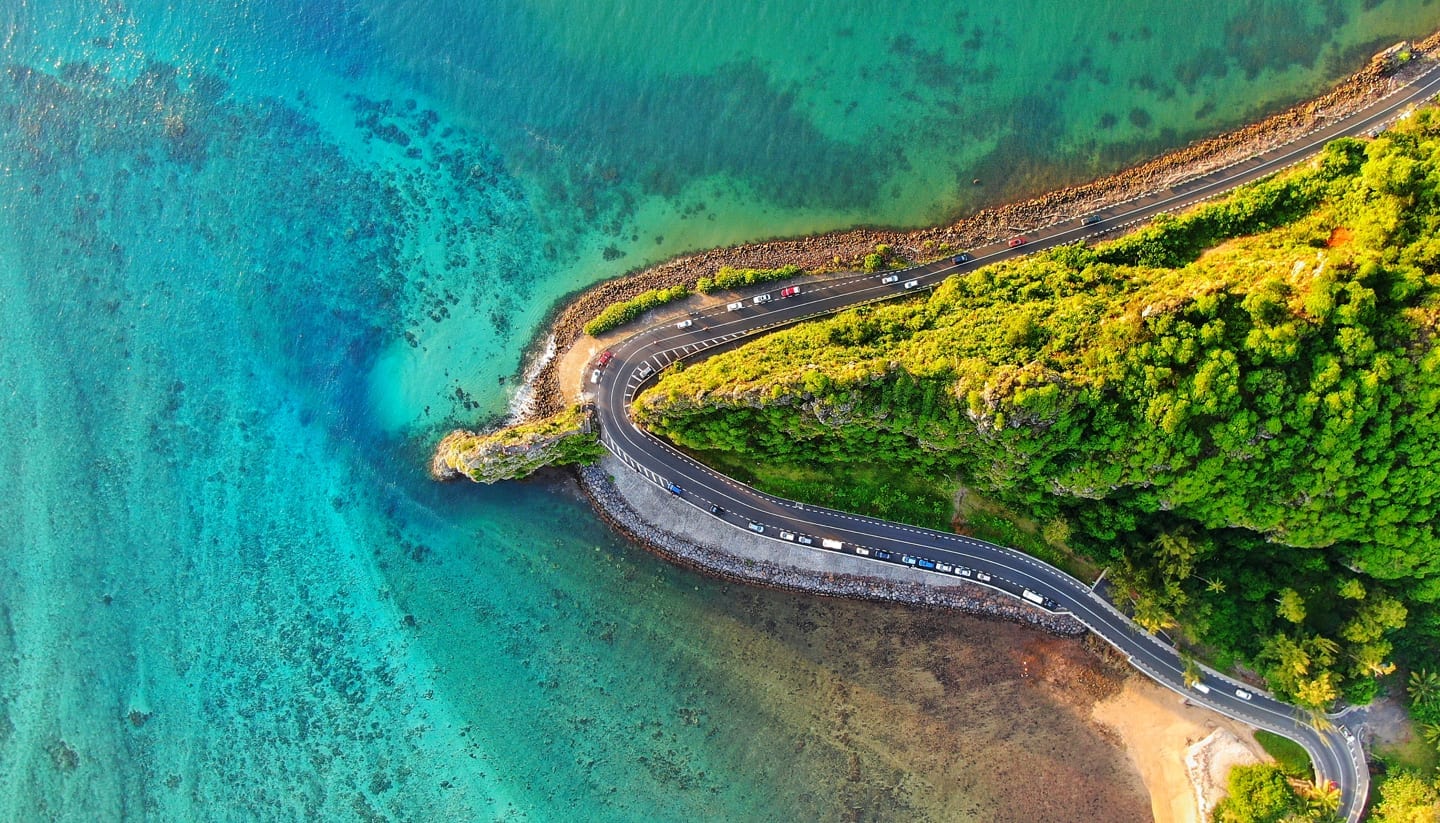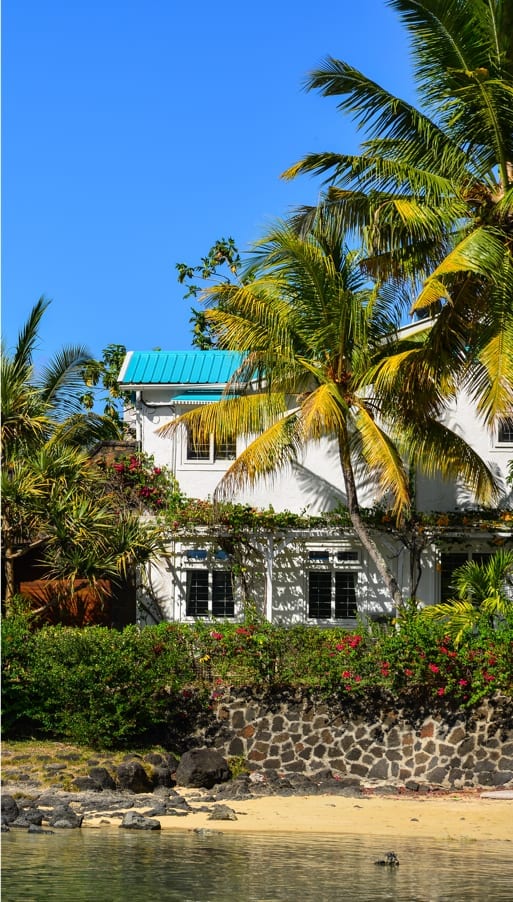
Dreaming about living the island life in beautiful Mauritius? Learn more about its history, its hottest spots, its regions and the laws that govern the country, so you can settle in peacefully !
At L’Adresse Immobilier, we walk you through every step of the way to finding your new home!
LEARN MORE ABOUT MAURITIUS’ HISTORY
Mauritius was discovered by the Portuguese at the beginning of the 16th century. It didn’t have any occupants until 1598, when the Dutch landed on the island. They introduced sugarcane, deer and monkeys, among others, and named the island Mauritius. In 1710, after exhausting some of the island’s most precious resources, including ebony, and devouring all Dodos, the Dutch left Mauritius.
It’s only five years later that the French took possession of the island, giving it the name Isle de France. As first settlers, under the reign of Governor Mahé de Labourdonnais, the French built the port and developed the rest of the island with administrative buildings, hospitals and forts, some of which still stand today. They also introduced the first African slaves to the island.
Strategically positioned on the Indian sea route, Mauritius was, at that time, also coveted by the British. The two colonies fought the Battle of Grand Port in 1810, with the British claiming victory and renaming the island Mauritius. They abolished slavery in 1835, welcoming the first Indentured Labourers from India, China, Madagascar and Africa. The latter contributed to the development of the island and the cultivation of sugarcane.
Mauritius became independent on 12 March 1968 and a Republic in 1992. Today, it comprises the islands of Rodrigues, Agaléga and St Brandon, among others. Thanks to the French then British influences, Mauritius’ official language is English and the most commonly spoken French.
Surface: 1865 Km2
Capital: Port Louis
Population: 1.3 million inhabitants, including Indians, Caucasians, Creoles, Chinese and Muslims, who have lived in harmony over the decades.
Languages: English, French, Creole and Eastern languages.
Religions: Hinduism, Islam and Christianity, among others.
Culture: Traditional Sega dance, Indian & Chinese dances and music, Reggae.
Currency: Mauritian Rupee (Rs/MUR).
Main source of revenue: Mauritius used to be mainly dependent on the sugarcane and textile industries. Today, its main source of revenue is tourism.


ITS CLIMATE
Mauritius has only two seasons: Summer and Winter. It enjoys a pleasant tropical climate all year round, with a hot & humid summer from November to April, and a warm winter from June to September.
ITS GEOGRAPHY
As a volcanic island, Mauritius is famous for its beautiful landscapes – its verdant mountains, plains and plateaus, its white sandy beaches lined with palm trees and filaos, its turquoise lagoons. The island is 65 Km in length and 45 Km in width.
ITS CUISINE
Mauritian cuisine is rich, varied, spicy. It is a melting pot of Chinese, Indian, European and Creole culinary specialities, all cooked the Mauritian way.
ITS SPORTS OFFER
Surrounded by beautiful lagoons, Mauritius is the ideal place to enjoy a selection of water sports and activities, including water ski, windsurf, surf, kite surf, deep-sea fishing, glass bottom boat, among others.
Various outdoor activities like golf, hiking, tennis or mountain biking are also available, giving young and old the opportunity to enjoy all that Mauritius has to offer!
IT’S REGIONS
The North:
The main city, Grand Bay, which was just a small village thirty years ago, has experienced a real expansion since then. Easily accessible using the highway that links the north to the south, the region is home to a selection of shops, a few administrative offices, a couple of renowned international schools, some beautiful beaches and an array of luxury hotels. The northern region is also a lively place where one can find excellent restaurants and coffee shops, as well as trendy bars and nightclubs. Residential areas at the heart of the city, or a short drive away, offer residents an exceptional quality of life.
Other well-known regions on the outskirts of Grand Bay include Pereybere, Bain Bœuf, Calodyne, Trou aux Biches, Mont Choisy, and in the north east, the village of Roches Noires.
The West:
This warm region, with landscapes reminiscent of the African savannah, is home to the villages of Tamarin and Black River. Residents have access to a selection of shops, some luxurious hotels and international schools. Surfers and kite surfers have most probably heard of the famous Tamarin Bay and the beautiful Morne peninsula. From coasts to mountain sides, the western region offers the most breath-taking views!
The Central Plateau:
At the heart of this rather cold and humid urban region stand the villages of Curepipe, Quatre Bornes, Floréal, Vacoas, Moka and Ebène, among others.
The central region, a twenty-minutes’ drive from the capital, houses very good international schools and a selection of fairly popular shopping centres.
The South and the East:
Still rural, almost untouched, the southern and eastern regions are definitely worth the detour. Though isolated and less developed than the others, these two regions are rapidly growing.
THE LAWS THAT GOVERN MAURITIUS
While Mauritius may seem lost in the middle of the Indian Ocean, it is actually strategically positioned between the African continent and Western countries. There are also many tax advantages for foreign investors, encouraging them to settle in.
Mauritius has experienced significant economic growth in recent years. In its pursuit to become a high-income economy, the Mauritian government has been facilitating and encouraging the expatriation of foreign talents, know-how and investment into the country.
Famous for its pleasant tropical climate, multiculturalism, hospitality, dynamic economy, attractive tax regimes, political and social stability, competitive business environment and selection of investment opportunities, Mauritius is a popular destination amongst foreigners living and working on the island.
There are three different types of permits offered to foreigners wishing to work, live or retire to Mauritius: the Occupation Permit, the Residence Permit or the Permanent Residence Permit. Foreigners can also acquire property by registering under any one of the following residential schemes:
– Integrated resort Scheme (IRS) and Real Estate Scheme (RES);
– Property Development Scheme (PDS);
– Smart City Scheme (SCS);
– Ground +2;
– Invest Hotel Scheme (IHS).
It is important to note that acquiring property in Mauritius as a non-citizen requires prior approval by the relevant Mauritian Authorities, namely The Prime Minister’s Office via the Economic Development Board (EDB).
L’Adresse Immobilier assists and guides you through every step of the way to purchasing your residence.
Acquisition of a residential unit for foreigners
Purchase within the Integrated Resort Scheme (IRS) and Real Estate Scheme (RES)
Foreigners can acquire property in existing projects, including the IRS and RES. Themselves and their dependents are eligible for a residence permit when investing a minimum amount of USD 375,000.
Owners may rent the property and become tax resident in Mauritius, without facing any restriction on the repatriation of funds or revenue raised from the sale or rental of the property.
Purchase within the Property Development Scheme (PDS)
The PDS, which has replaced the IRS and RES, allows the development of a mix of residences, for sale to non-citizens, citizens and members of the Mauritian Diaspora.
The PDS provides for:
1. The development of luxurious residential units on freehold land of an extent of at least 0.4220 hectare (1 arpent);
2. The development of at least six residential properties of high standing;
3. High quality public spaces that help promote social interaction and a sense of community;
4. High-class leisure, commercial amenities and facilities intended to enhance the residential units;
5. Day-to-day management services to residents, including security, maintenance, gardening, solid waste disposal and household services;
6. Social contribution in terms of social amenities, community development and other facilities, for the benefit of the community.
A non-citizen is eligible for a residence permit upon the purchase of a villa under the PDS scheme when s/he has invested more than USD 375,000 or its equivalent in any freely convertible foreign currency.
The PDS is also a demarcation from the IRS and RES as it does not differentiate between small and big landowners, and harmonises the registration duty to a single rate of 5% instead of USD 70,000 on registration of a deed under IRS and USD 25,000 under RES.
Purchase within the Smart City Scheme (SCS)
Through the SCS, the Mauritian Government proposes global investors multiple opportunities to share in the vision of Mauritius to create intelligent, innovative and sustainable cities for tomorrow.
Smart Cities, revolving around the “work, live and play” concept, incorporate mixed use developments in cosmopolitan conurbations, with smart technology and pioneering innovation at their core. The goal is to deliver a happier lifestyle, through the development of self-sufficient cities offering integrated sustainable solutions and ensuring minimum wastage and maximum comfort for the long-term benefit of all citizens and the future generations, irrespective of social and economic class.
Dedicated to bringing these ambitious goals to life, the Mauritian Government has set up the Smart City Scheme, providing investors with a clearly defined enabling framework and an attractive package of fiscal and non-fiscal incentives. This paves the way for tremendous investment opportunities in a wide array of components in the pioneering urban development.
Enterprising visionaries have already presented compelling smart city development projects that complement the island’s scenic spots.
Purchase of an apartment in a building of not less than 2 floors
(Ground + 2)
The Non-Citizens (Property Restriction) Act, amended on 20 December 2016, allows foreigners to purchase apartments in condominium developments of at least two levels above ground (Ground +2), with the prior approval of the Board of Investment. The amount payable for the acquisition of an apartment must not be less than Rs 6 million or its equivalent in any other freely convertible foreign currency.
Any non-citizen, with or without an occupation permit, residence permit or permanent residence permit, may acquire apartments. There is, therefore, no restriction for non-citizens who wish to acquire:
– A residential unit developed under the IRS, RES and PDS;
– A residential unit developed in a Smart City;
– An apartment located in a building of at least two floors above the ground floor (Ground +2).
Purchase within the Invest Hotel Scheme (IHS)
The Invest Hotel Scheme has been set as an alternative financing mechanism allowing new hotel developers and existing hotel companies to sell hotel rooms to finance the construction of new hotels or the refurbishment, reconstruction, alteration or upgrading of existing hotels.
This scheme allows investors and individual guests to partake in the success of Mauritius’ thriving strategic hospitality sector by becoming an owner of exclusive hotel units located in Mauritius. It offers individual buyers all the facilities of exquisitely-furnished luxury resort hotels, including amenities like F&B, resort-style pools, fully equipped spas and fitness centres, with the promise of an income.
The unit owner or their representative may use the unit for a total of 45 days in any period of 12 months. As well as enjoying the privilege of their hotel unit, owners have the prospect of sharing in unexploited hotel returns and can enjoy diversification benefits through lease back.
Acquisition of a residential unit for Mauritian citizens
Registration under the Mauritian Diaspora Scheme (MDS)
The MDS aims to encourage members of the Mauritian Diaspora to come back to Mauritius and contribute to the country’s economic development.
This programme has been designed for all Mauritians who have lived and worked abroad before 24 March 2015, and who have the necessary skills, talent and experience to return and work in Mauritius.
For more information on this scheme, please visit www.diaspora.mu.
All of the above “legal” information is extracted from the Economic Development Board’s (EDB) website.

